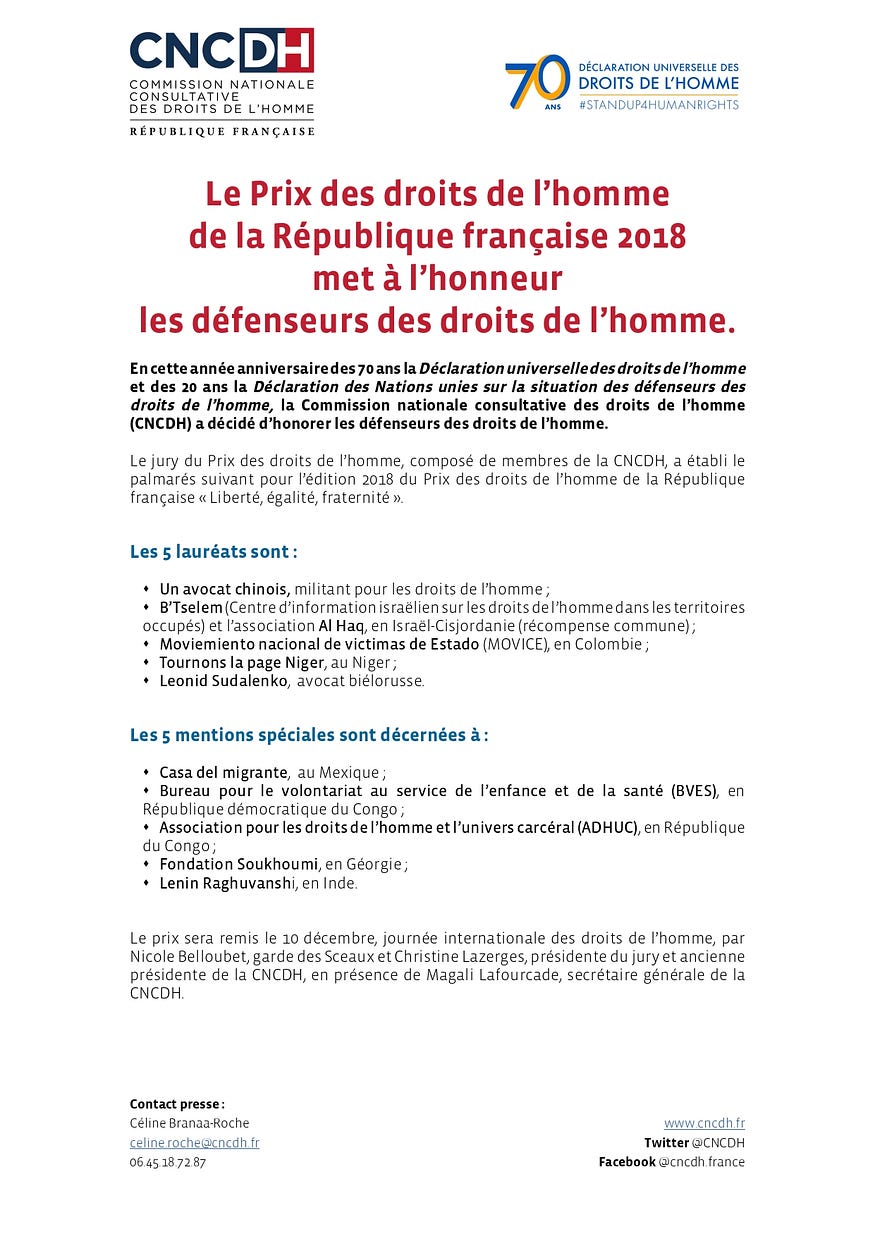Celebrating a Champion for Dalit Rights in India
We are thrilled to announce that Dr. Lenin Raghuvanshi has been awarded a special mention in the Human Rights Prize of the French Republic 2018, under the prestigious banner of “Liberty, Equality, Fraternity.” This recognition by the Commission nationale consultative des droits de l’homme (CNCDH) highlights Lenin’s relentless dedication to advocating for the rights of Dalits and other marginalized communities in India. The Citation describes, “Lenin Raghuvanshi is an activist for the rights of Dalits in India. He is one of the founding members of the People’s Vigilance Committee on Human Rights (PVCHR), which works for the development of marginalized sections of society. Deeply convinced of the necessity to eliminate all discrimination based on the caste system, he created a new non-violent social movement to end caste-based discrimination and the resulting forced labor, which affects marginalized communities, particularly Dalits and Adivasis. He is regularly threatened with death and prosecuted by local authorities. The jury wished to encourage Lenin Raghuvanshi’s original and non-violent approach to action.”
Lenin Raghuvanshi’s Inspiring Work
Lenin Raghuvanshi is a tireless activist for the rights of Dalits. As a founding member of the People’s Vigilance Committee on Human Rights (PVCHR), Lenin has been instrumental in advancing the development and protection of marginalized sections of society. His commitment to eliminating caste-based discrimination has led him to create a powerful non-violent social movement aimed at ending the systemic injustice and forced labor affecting Dalits and Adivasis.
The CNCDH, a French governmental organization established in 1947, recognized Lenin’s original and non-violent approach to human rights advocacy. The CNCDH monitors human rights in France, advises the government, and proposes legislation. It includes representatives from various sectors, ensuring a comprehensive approach to human rights issues.
A Journey of Recognition and Challenges:A Long-Awaited Recognition
Lenin received the special mention award’s medal and diploma on May 27, 2024. Upon receiving the honor, he expressed his gratitude: “This recognition honors all human rights defenders working in South Asia. I am deeply grateful to Shirin Shabana Khan for her extraordinary efforts and remarkable work that led to this award. My heartfelt thanks go to my life partner, Shruti Nagvanshi, and my mentor, Dr. Mohanlal Panda. Congratulations to all associates of PVCHR.”
Despite the award being announced in 2018, Lenin faced delays in receiving his recognition. He speculated that his past criticisms of European support for Hindu nationalist ideologies might have influenced the delay. However, his dedication to advocating for human rights remained unwavering.
Looking Forward with Hope and Determination
Lenin’s recent writings reflect his enduring passion and the global impact of his work. He recalls meetings with significant figures like the late French President Jacques Chirac and author Dominique Lapierre, which underscore the international resonance of his mission.
In a poignant blog post from July 2023, Lenin detailed the emotional journey of receiving the CNCDH’s special mention and the complexities surrounding his delayed recognition. Despite the challenges, he remains committed to his cause and hopeful for future recognition and justice.
Continuing the Fight for Justice

Dr. Lenin Raghuvanshi’s story is a powerful testament to resilience and determination in the face of systemic injustice. His work with PVCHR and his advocacy for Dalit rights embody the spirit of non-violent resistance and the pursuit of equality. The special mention from the CNCDH not only honors his past efforts but also encourages continued action against caste-based discrimination.
Celebrating the Spirit of Kashi: Preserving Diversity and Pluralism in Varanasi
It is an honor to celebrate the diversity and inclusive culture of Kashi. I believe the delay is a conspiracy against the spirit of Kashi. “We are dealing with corporate as well as communal fascism. The communal issue is not only inter-religious but intra-religious too. When communitarianism imagines its identity vis-à-vis the opposition of an ‘Other,’ it immediately becomes communal. Therefore, secularism also entails working on caste, class, and patriarchal divisions within a community.”
Varanasi’s rich cultural heritage is reflected in its music, literature, and social fabric. The city has produced Bharat Ratna awardees like Shehnai maestro Ustad Bismillah Khan and sitar virtuoso Pt. Ravi Shankar. It has also been a hub for writers like Munshi Premchand and philosophers like Bhagwan Das, who have contributed significantly to India’s intellectual and cultural discourse.
The need to preserve Varanasi’s pluralistic and inclusive ethos is crucial. The proposal to declare Varanasi a Living Heritage City aims to conserve its ancient charm while promoting sustainable livelihoods for its artisans. It is essential to teach younger generations the values of pluralism and reconciliation to counter sectarianism and foster a harmonious society. As Varanasi continues to be a beacon of India’s civilizational ethos, it reminds us that diversity and pluralism are our greatest strengths. By protecting and promoting these values, we can ensure a future where all communities coexist peacefully and prosper together.


No comments:
Post a Comment